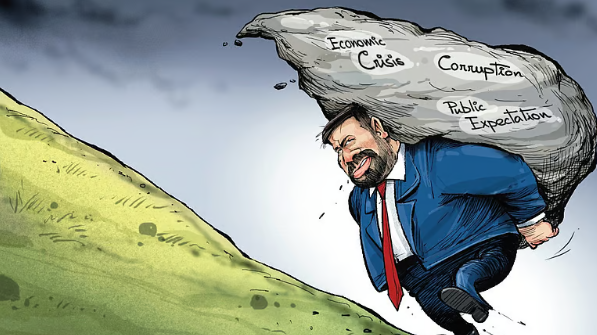
Four months after being elected president, Anura Kumara Dissanayake must fix multiple unresolved issues of corruption, rights abuses and long-term displacement. All while doing a tightrope walk to balance India and China’s concerns. His most daunting challenge is economic recovery from ground zero and managing public expectations.
As the new government’s honeymoon period wanes, people are getting impatient about delivery, especially on the spiralling cost of living and shortage of rice, the island’s staple. The dire economic situation has increased poverty, doubling the number of people living under the World Bank’s extreme poverty line of $2.15 a day to nearly 26 percent. As more people feel the hunger pang, there is increasing criticism of the government’s performance over rising commodity prices; an indication of the public mood may come when elections to the local authorities are held.
This government, however, is in stark contrast to the earlier Rajapaksa rule, which was known for excessive spending and alleged corruption. The public is impatiently waiting for the wheels of justice to turn and those responsible for corruption to be brought to book. But justice takes time, as does economic recovery.
Addressing one of the public’s top concerns, the government recently took action against two sons of former president Mahinda Rajapaksa—Yoshitha and Namal. Namal, the first-born, who is a member of parliament and the national organiser of the Sri Lanka Podujana Peramuna, was indicted on charges of criminal misappropriation of LKR 70 million in connection with the Krrish Tower project in Colombo. Yoshitha was arrested on a charge of money laundering that had been hanging since 2019, when the Financial Crimes Investigation Division (FCID) was dissolved. During President Maithripala Sirisena’s term (2015 to 2019), the FCID had investigated and charged several members of the Rajapaksa family.
This is not the first time a Rajapaksa offspring has been linked to money laundering. Yoshitha was also arrested in 2016 during Sirisena’s administration on a separate laundering charge linked to the purchase of a television network. As with most cases linked to the powerful family, they have not moved forward for several years.
Despite the many cases pending in courts against the powerful Rajapaksa family and its close associates, the arrests are the new regime’s first moves on the issue since assuming office. On January 27, Yoshitha, a former Navy officer, was released on a bond worth LKR 100 million ($3,440,000) and was barred from leaving the island.
Yoshitha’s case is the stuff fairytales are made of. The suspect failed to explain to court how he raised funds to purchase a home in a Colombo suburb, acquired during his father’s two-term presidency. The nation now has to absorb the tale of how a bag of gems from his grandmother was sold to raise funds; there is no trace of how Daisy Forrest Wickremasinghe came to possess the precious stones in the first place.
However, the arrests are of significant symbolic value for a government that sought a mandate to fight corruption, one of the key demands of the Galle Face protesters in 2022 who eventually overthrew the Rajapaksas. With the sons’ arrests, the people finally see the Rajapaksas being served notice. There are still allegations of corruption against their uncle, former president Gotabaya Rajapaksa, over questionable military purchases, which is at a different level of investigation.
The National People’s Power (NPP) administration has pledged to fight corruption and expedite prosecution to deliver justice and bring closure. But that’s easier said than done.
The hardest promise to keep will be the revival of the island’s economy while offering welfare measures to those in need and bringing the cost of living down. The task is made harder with having to strike a fine balance between India and China, two significant creditors.
Feathers are being ruffled as Sri Lanka strives to wriggle out of a controversial power project in Mannar from the hands of India’s Gautam Adani, which will naturally carry repercussions. Meanwhile, President Dissanayake inked 15 agreements during his visit to Beijing earlier this month, including a $3.7-billion deal with Sinopec to set up a refinery in Hambantota. There is a commitment to advance the Belt and Road Initiative projects, such as the Colombo Port City and Hambantota port, and a new currency swap, besides other collaborations on trade, agriculture, digital economy and education.
Interestingly, President Dissanayake pledged support for Beijing’s One China policy, that subsumes the autonomous regions of Tibet and Xinjiang, with more gusto.
While how Dissanayake balances Indian and Chinese interests will go beyond foreign policy to leave a strong imprint on the island’s economy, the NPP must introduce equitable economic policies that benefit the poor as well as address unresolved human rights issues, including the legal reforms that uphold Sri Lanka’s status as a democracy.
The world is watching the new administration with keen eyes, particularly on two outstanding issues that contributed to the island’s democratic decline: gross violations of rights during the 27-year war between the armed forces and the Liberation Tigers of Tamil Eelam, and tackling corruption.
In October 2024, the UN Human Rights Council extended the mandate of the High Commissioner for Human Rights to monitor and report on the island’s rights violations and gather evidence of purported crimes to support domestic and international prosecutions. It is also morally incumbent upon a JVP-led government, responsible for two insurgencies and having lost its cadres and enforced disappearances, to address accountability issues of a different phase in the island’s political history.
The Office of Missing Persons was an ambitious start in 2017 but eventually made little progress, while a promised body to investigate war crimes, similar to South Africa’s Truth Commission, never saw the light of day.
Absence of accountability is a serious black mark on Sri Lanka and not taking action in this front will also result in a credibility crisis for the new administration. Given their own experience, the JVP-led government should make a better commitment to the delivery of justice and create a pathway for non-recurrence.






